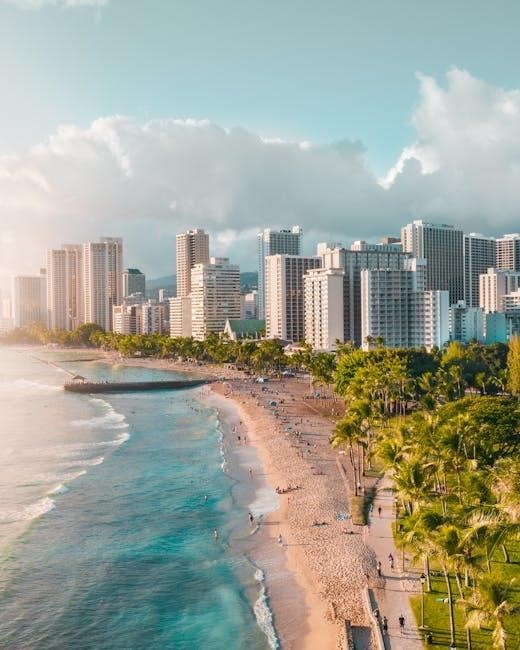state of hawaii condo guide
Hawaii condo living offers a unique lifestyle, blending island beauty with modern amenities. The Hawaii Condo Guide provides comprehensive resources for buyers, sellers, and owners, detailing condo ownership basics, market trends, and community living tips. Explore detailed listings, floor plans, and neighborhood insights to find your perfect Hawaiian home.
Overview of Condominium Ownership in Hawaii
Condominium ownership in Hawaii offers a unique lifestyle with shared responsibilities. Owners hold title to their unit and a proportionate interest in common areas. The Hawaii Condo Guide outlines ownership basics, including legal structures and community living. Condo associations manage shared spaces, while owners are responsible for unit maintenance. Legal documents like the CC&Rs govern rules and fees. Resources like the Hawaii Condo Living Guide and online databases provide detailed insights, helping owners navigate ownership responsibilities and community expectations effectively.
Benefits of Living in a Hawaii Condo
Living in a Hawaii condo offers numerous benefits, including prime locations, resort-like amenities, and a sense of community. Condos often feature stunning ocean views, pools, and fitness centers, enhancing your island lifestyle. The Hawaii Condo Guide highlights eco-friendly designs and energy-efficient features, appealing to environmentally conscious residents. Additionally, condos provide a lock-and-go convenience, ideal for seasonal residents. With detailed resources like the Oahu Condo Database and insights into market trends, condo living in Hawaii is both rewarding and practical for various lifestyles and investment goals.
Top Condo Locations in Hawaii
Discover Hawaii’s premier condo locations across Oahu, Maui, Kauai, and the Big Island. Explore top areas like Waikiki, Kaanapali, Princeville, and Hilo for ideal island living.
Oahu Condo Guide
Oahu offers a diverse range of condos, from vibrant Waikiki to serene North Shore. The Oahu Condo Guide provides detailed listings, highlighting locations, floor plans, and amenities. Explore premium properties in Honolulu, Kakaako, and Ala Moana, each offering unique lifestyles. With insights into neighborhood maps and market trends, this guide helps buyers and renters make informed decisions. Whether seeking luxury or affordability, Oahu’s condo market caters to all preferences, making it a top choice for island living.
Maui Condo Guide
Maui’s condo market offers a mix of luxury and affordability, with options in prime locations like Kaanapali, Lahaina, and Wailea. The Maui Condo Guide features detailed listings, showcasing beachfront properties, resort amenities, and scenic views. From spacious family-friendly units to sleek modern designs, Maui condos cater to diverse lifestyles. Explore market trends, neighborhood insights, and tips for finding the perfect property. Whether seeking adventure or relaxation, Maui’s condos provide the ultimate island living experience.
Kauai Condo Guide
Kauai, known as the “Garden Isle,” offers a serene condo living experience. The Kauai Condo Guide highlights properties in scenic areas like Poipu, Princeville, and Kapaa. With a range of options from oceanfront units to cozy inland retreats, Kauai condos blend natural beauty with modern comfort. The guide provides detailed listings, including amenities, floor plans, and market trends. Whether seeking adventure or tranquility, Kauai’s condos offer a unique island lifestyle, making them a popular choice for both residents and vacationers.
Big Island Condo Guide
The Big Island, with its diverse landscapes, offers a wide range of condo living options. From oceanfront properties in Kona and Waikoloa to quieter communities in Hilo, the Big Island Condo Guide provides insights into the island’s real estate market. Detailed listings, including amenities and floor plans, help buyers find their ideal home. The guide also covers market trends and tips for navigating the local condo market, making it an essential resource for those looking to own or rent a condo on the Big Island.
Hawaii Condo Buying Guide
The Hawaii Condo Buying Guide offers a comprehensive roadmap for purchasing a condo, from understanding ownership basics to navigating market trends and legal considerations. Utilize detailed online databases and expert tips to make informed decisions. This guide ensures buyers are well-prepared for the process, covering essential steps and resources to find the perfect Hawaiian property.
Steps to Buy a Condo in Hawaii
Buying a condo in Hawaii involves thorough research and planning. Start by exploring online databases like the Hawaii Condo Guide to find properties matching your lifestyle. Secure pre-approval for financing and work with a knowledgeable real estate agent. Evaluate locations, amenities, and condo fees. Conduct a detailed review of the property, including its history and community rules. Make an informed offer, negotiate terms, and ensure all legal and financial aspects are addressed. Finally, close the deal and complete the necessary paperwork to secure your Hawaiian home.
Understanding Condo Fees and Costs
Condo fees in Hawaii vary by property and location, typically covering maintenance, utilities, and amenities. These fees are managed by the Homeowners Association (HOA) and may range from $500 to $1,000 per month. Factors influencing costs include the condo’s size, amenities, and age. It’s essential to review the condo’s financial disclosures to understand ongoing expenses. Potential buyers should also consider special assessments for major repairs. Researching these costs ensures transparency and helps buyers budget effectively for their Hawaiian condo lifestyle.
Legal and Financial Considerations
When purchasing a condo in Hawaii, understanding the legal and financial aspects is crucial. Buyers must review the condo’s governing documents, including CC&Rs and bylaws. The Hawaii Real Estate Commission requires disclosures about fees, assessments, and property conditions. Financially, buyers should evaluate mortgage options, property taxes, and insurance costs. Consulting with a real estate attorney can help navigate legal complexities. Additionally, understanding the HOA’s role and budget ensures clarity on shared responsibilities and expenses, making informed decisions easier for condo buyers in Hawaii.
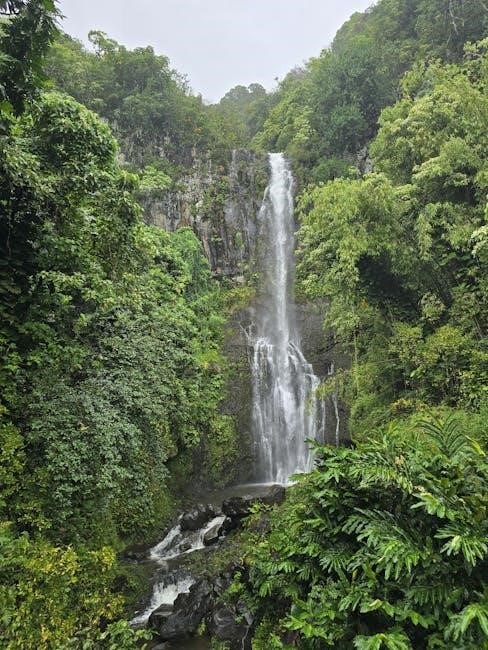
Renting a Condo in Hawaii
Renting a condo in Hawaii offers a flexible way to experience island living. Popular areas like Oahu and Maui provide diverse options, from beachfront to urban locales. Lease agreements vary, with short-term and long-term rentals available. Researching neighborhoods and understanding rental policies ensures a smooth transition into Hawaiian condo living. Online guides and real estate tools can help find the perfect rental property tailored to your preferences and budget.
Best Areas to Rent a Condo
Hawaii offers diverse condo rental options across its islands. Oahu’s Waikiki, Kaka’ako, and Ala Moana are popular for urban convenience and amenities. Maui’s Kaanapali and Lahaina provide beachfront luxury, while Kauai’s Princeville boasts scenic views. The Big Island’s Kailua-Kona is ideal for family-friendly living. Each area caters to different lifestyles, from vibrant city life to peaceful coastal retreats. Research neighborhoods using the Hawaii Condo Guide to find rentals that match your preferences and budget. Compare locations, amenities, and lease terms for the perfect island home.
Understanding Lease Agreements
A lease agreement is a legally binding contract outlining terms for renting a condo in Hawaii. It specifies rent, lease duration, security deposits, and responsibilities of both tenant and landlord. Key clauses include maintenance obligations, pet policies, and renewal options. Tenants should carefully review all terms before signing. The Hawaii Condo Guide offers resources to help renters understand lease agreements and ensure compliance with state laws. Clarify any doubts with the landlord or property manager to avoid disputes during occupancy. Understanding the agreement is crucial for a smooth rental experience in Hawaii.
Short-Term vs. Long-Term Rentals
When renting a condo in Hawaii, understanding the differences between short-term and long-term rentals is essential. Short-term rentals, often used by vacationers, offer flexibility with shorter commitments, typically less than six months. Long-term rentals provide stability with fixed lease terms, usually one year or more. The Hawaii Condo Guide highlights that short-term rentals may require additional fees, while long-term leases often include more negotiable terms. Both options cater to different needs, with short-term appealing to tourists and long-term suiting residents. Review lease agreements carefully to ensure alignment with your lifestyle and plans.
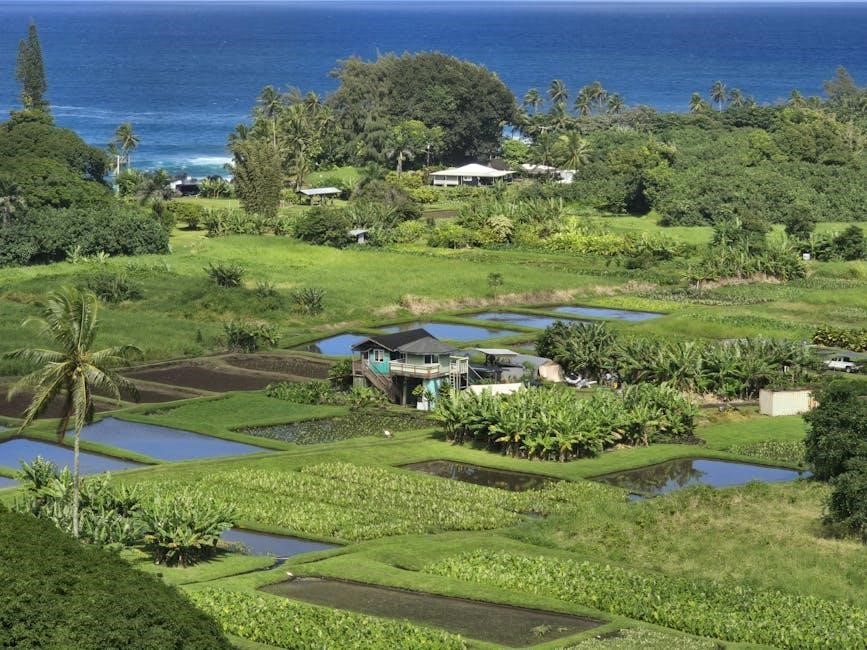
Hawaii Condo Market Trends
Hawaii’s condo market is experiencing steady growth, with rising property values and high demand. The Hawaii Condo Guide highlights increasing sales in popular areas like Waikiki, driven by tourism and remote work trends.
Current Market Conditions
Hawaii’s condo market is thriving, with high demand and limited inventory driving property values up. According to the Hawaii Condo Guide, sales are robust in areas like Waikiki and Kakaako, fueled by tourism recovery and remote work trends. Prices remain elevated, reflecting strong competition among buyers. The market is expected to stay competitive, with new developments emerging to meet growing demand. This dynamic environment makes it a prime time for both buyers and sellers to engage in Hawaii’s condo market.
Future Outlook for Condo Investments
Hawaii’s condo market is poised for continued growth, driven by tourism recovery and increasing demand for island living. With limited land availability, condos remain a popular choice, especially in urban areas like Honolulu. New developments and renovations are expected to cater to modern buyers, emphasizing sustainability and luxury. As remote work trends persist, condos in Hawaii are likely to attract both residents and investors seeking long-term appreciation. The future outlook remains promising, making condos a strategic investment in Hawaii’s thriving real estate market.
Impact of Tourism on Condo Demand
Tourism significantly influences Hawaii’s condo demand, with visitors often seeking convenient, amenities-rich accommodations. Condos in prime locations like Waikiki and Kaanapali are in high demand, especially during peak travel seasons. The rise of short-term rentals has further boosted condo popularity, attracting investors who capitalize on tourism trends. As Hawaii remains a top global destination, condo demand is expected to stay strong, driven by both vacationers and investors looking to tap into the lucrative rental market. This dynamic ensures sustained interest in Hawaii’s condo market.
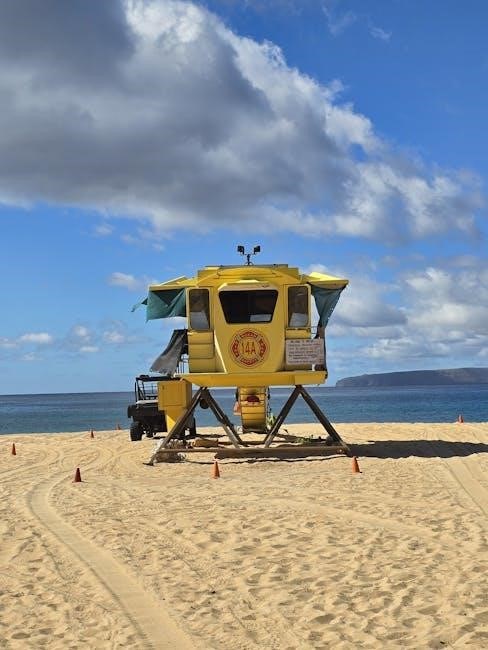
Condo Maintenance and Management
Condo maintenance and management involve HOA oversight, regular upkeep, and shared financial responsibilities, ensuring communities remain well-maintained, harmonious, and sustainable.
Role of the HOA (Homeowners Association)
The HOA plays a central role in managing Hawaii condos, enforcing rules, and maintaining common areas. It collects fees to fund repairs and improvements, ensuring community standards are upheld. The HOA also mediates disputes and organizes meetings to keep residents informed. Additionally, it provides resources like the Hawaii Condo Living Guide, helping owners understand their rights and responsibilities. By fostering a sense of community, the HOA contributes to a harmonious living environment for all residents. Proper management ensures long-term property value and resident satisfaction.
Maintenance Costs and Responsibilities
Maintenance costs in Hawaii condos are shared among owners, covering common areas like pools, landscaping, and building repairs. These fees vary by property and are determined by the HOA. Owners are responsible for their unit’s interior, while the HOA handles exterior and shared spaces. Proper maintenance ensures property value retention and community well-being. The Hawaii Condo Guide provides insights into budgeting for these costs and understanding individual vs. shared responsibilities. Regular upkeep and clear communication are key to a smooth condo living experience.
Dispute Resolution in Condo Communities
Dispute resolution in Hawaii condo communities often involves mediation or arbitration to address conflicts between owners, the HOA, or management. The Hawaii Condo Guide emphasizes the importance of clear communication and documentation to resolve issues efficiently. Understanding HOA rules and seeking legal advice when necessary can help maintain harmony within the community. Regular meetings and transparent decision-making processes also play a key role in preventing and resolving disputes effectively.
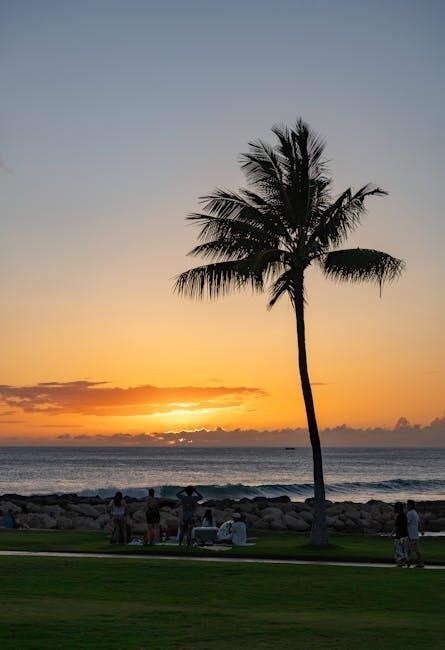
Condo Living Resources
The Hawaii Condo Living Guide offers extensive resources, including online databases, video series, and expert tips, to help residents and buyers navigate condo life effectively in Hawaii.
Hawaii Condo Living Guide
The Hawaii Condo Living Guide is a comprehensive resource designed to assist residents and buyers in understanding condo ownership. This guide covers essential topics such as condo fees, maintenance responsibilities, and community living tips. It also provides detailed information on condo listings, floor plans, and neighborhood insights across various islands. Additionally, the guide offers video series and expert advice to help navigate the condo market effectively, ensuring a smooth transition into Hawaiian condo life;
Online Condo Databases and Tools
Online condo databases and tools provide essential resources for Hawaii condo buyers and owners. Platforms like the Hawaii Condo Guide offer detailed TMK-based information, condo listings, and market trends. These tools allow users to research properties, compare amenities, and explore neighborhoods. Additionally, interactive maps and floor plans help visualize potential homes. Real estate professionals and legal experts benefit from comprehensive databases, ensuring informed decisions. These resources streamline condo searches and provide valuable insights for those navigating Hawaii’s condo market.
Real Estate Agent Tips for Condo Buyers
Real estate agents recommend buyers carefully evaluate condo locations, amenities, and fees. Understanding the condo’s financial health and future development plans is crucial. Agents suggest reviewing detailed listings and comparing properties using online databases. Legal aspects, such as ownership rights and HOA rules, should be thoroughly understood. Working with a knowledgeable agent ensures buyers navigate Hawaii’s unique condo market effectively. These tips help buyers make informed decisions and find the perfect condo tailored to their lifestyle and budget.

Sustainable Living in Hawaii Condos
Hawaii condos emphasize eco-friendly designs, energy efficiency, and sustainable practices, offering residents a harmonious blend of modern living and environmental stewardship in tropical paradise settings.
Eco-Friendly Condo Designs
Eco-friendly condo designs in Hawaii prioritize sustainability, incorporating solar panels, energy-efficient appliances, and recycled materials. Many condos feature open-air layouts to maximize natural ventilation, reducing reliance on air conditioning. Green building certifications, such as LEED, are increasingly common, ensuring environmentally responsible construction. Sustainable practices extend to landscaping, with native plants and rainwater harvesting systems. These designs not only minimize environmental impact but also offer residents a healthier, cost-effective living space. Hawaii’s condo market is embracing eco-conscious trends, making it a leader in sustainable urban living.
Energy Efficiency in Condos
Hawaii condos increasingly feature energy-efficient designs to reduce utility costs and environmental impact. Solar panels, energy-efficient appliances, and smart home technology are common upgrades. Many buildings incorporate LED lighting and programmable thermostats to optimize energy use. Some condos even achieve net-zero energy consumption through advanced systems. State incentives and rebates encourage developers to adopt eco-friendly solutions. These energy-saving measures not only benefit the environment but also lower residents’ utility bills, making condo living more sustainable and cost-effective in Hawaii.
Sustainable Community Practices
Hawaii condos often embrace sustainable community practices to promote eco-friendly living. Many developments implement recycling programs, composting initiatives, and green spaces to reduce waste and enhance biodiversity. Community gardens and water conservation systems are also common, fostering a sense of environmental stewardship. Some condos incorporate shared transportation options and energy-efficient communal areas to reduce carbon footprints. These practices not only support Hawaii’s unique ecosystems but also create a stronger, more connected community for residents, making sustainable living a priority in condo communities across the islands.
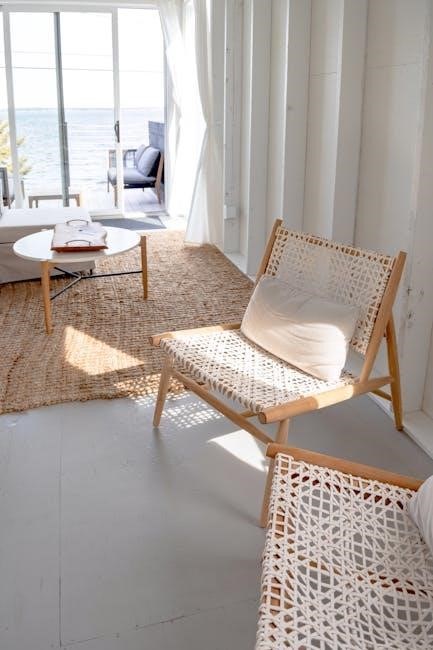
Condo Safety and Security
Hawaii condos prioritize safety and security through advanced systems, emergency preparedness, and community vigilance, ensuring a protected and secure living environment for all residents.
Emergency Preparedness in Condos
Emergency preparedness is crucial for Hawaii condo residents, given the state’s vulnerability to natural disasters. The Hawaii Condo Living Guide emphasizes the importance of having emergency kits, evacuation plans, and regular drills. Condo associations often outline procedures for earthquakes, tsunamis, and hurricanes, ensuring residents are well-prepared. Staying informed and actively participating in community safety efforts helps create a resilient living environment for all condo owners and renters in Hawaii.
Security Features to Look For
When evaluating Hawaii condos, prioritize security features like keycard access, surveillance cameras, and secure entry systems. Look for well-lit parking areas and emergency response plans. On-site security personnel and monitored alarms add extra safety layers. Ensure the condo has a fire safety plan and evacuation routes. Review the building’s history of incidents and management’s approach to security. A safe and secure environment is essential for peaceful condo living in Hawaii.
Fire Safety and Prevention
Fire safety is crucial in Hawaii condos. Ensure the building has smoke detectors, fire extinguishers, and a sprinkler system. Regular fire drills and clear evacuation routes are essential. Check for fire-resistant materials in construction and proper emergency exit signage. Review the condo’s fire safety plan and understand the role of the HOA in maintaining these systems. Stay informed about local fire codes and prevention tips to protect your home and community in Hawaii.

Condo Renovation and Upgrades
Plan your condo renovation carefully, ensuring compliance with local regulations. Obtain necessary permits and consider upgrades that enhance property value and modernize your Hawaiian home.
Planning a Condo Renovation
Planning a condo renovation in Hawaii requires careful consideration of space, budget, and local regulations. Start by assessing your needs and consulting with professionals. Research permits and HOA rules to ensure compliance. Create a detailed timeline and budget, prioritizing upgrades that enhance functionality and aesthetics. Consider sustainable materials and energy-efficient solutions to align with Hawaii’s eco-friendly trends. Collaborate with licensed contractors to bring your vision to life while maintaining harmony with the building’s existing design and community standards.
Obtaining Necessary Permits
Obtaining permits is a critical step in condo renovations in Hawaii. Ensure compliance with local building codes and HOA regulations by submitting detailed plans. Secure approvals from relevant authorities before starting work. Failure to obtain proper permits can lead to fines or project delays. Work with licensed contractors familiar with Hawaii’s permitting process to streamline approvals. Regular inspections may be required to ensure compliance. Plan ahead, as permit processing times can vary depending on the scope of the project and local requirements.
Increasing Property Value Through Upgrades
Strategic upgrades can significantly boost your Hawaii condo’s value. Modernizing kitchens and bathrooms with high-quality finishes often yields strong returns. Enhancing outdoor spaces, such as lanais, to capitalize on island views is highly desirable. Energy-efficient features and smart home technology also attract buyers. Staying within budget while focusing on timeless designs ensures long-term appeal. Consulting with local experts can help tailor upgrades to current market demands, maximizing your investment’s potential in Hawaii’s competitive condo market.
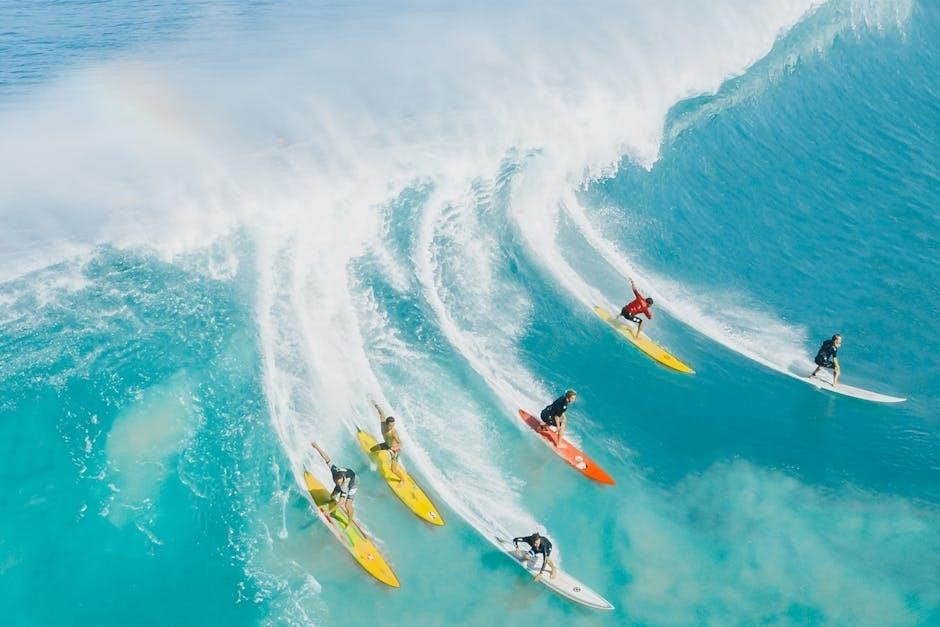
Condo Insurance and Liability
Condo insurance in Hawaii protects against losses from natural disasters and liability. Policies vary, so understanding coverage is crucial to avoid gaps and ensure protection.
Understanding Condo Insurance Policies
Condo insurance policies in Hawaii protect owners from losses due to damage or liability. Most policies cover interior walls, fixtures, and personal property, while the HOA typically insures the building and common areas. However, coverage can vary, so reviewing your policy is essential. Liability coverage is also crucial in case of accidents or property damage. Natural disaster risks, like hurricanes or volcanoes, may require additional coverage. Always ensure your policy aligns with Hawaii’s unique conditions and consult with an insurance professional to avoid gaps in protection.
Liability Coverage for Condo Owners
Liability coverage is essential for Hawaii condo owners to protect against legal and financial risks. It typically covers damages or injuries occurring within the unit or common areas. Policies may include medical expenses, legal fees, and property damage caused by the owner or their guests. While the HOA often insures common areas, individual liability coverage ensures personal protection. Understanding policy limits and additional coverage options, especially in high-risk scenarios, is crucial. Consulting with an insurance professional can help tailor coverage to specific needs and avoid potential gaps in protection.
Natural Disaster Insurance Considerations
Hawaii’s unique location makes it prone to natural disasters like hurricanes, earthquakes, and volcanic eruptions. Condo owners must ensure their insurance policies cover such events. Standard policies may not include flood or earthquake damage, requiring additional coverage. Volcanic eruption insurance is particularly vital, as it can protect against lava and ash damage. Understanding policy terms, deductibles, and coverage limits is crucial. Consulting with insurance experts can help tailor policies to address Hawaii’s specific risks, ensuring financial protection against these unpredictable events and safeguarding your investment effectively.
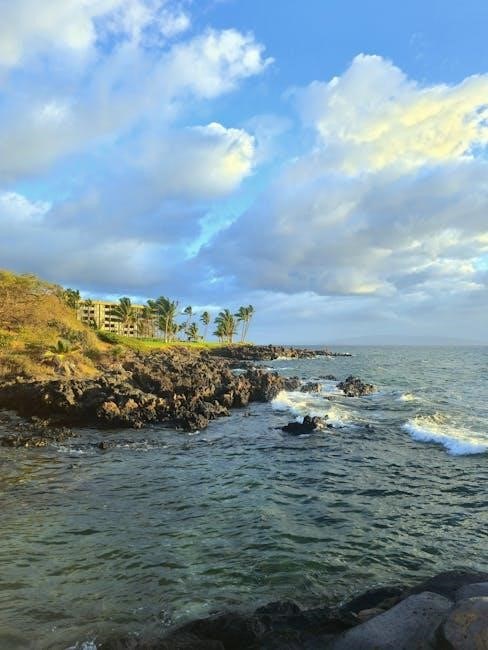
Condo Community Life
Hawaii condos foster a sense of ohana through community events, shared amenities, and collaborative living. Building connections with neighbors and participating in local gatherings enhances island lifestyle experiences.
Building a Sense of Community
Building a sense of community in Hawaii condos involves fostering connections among residents through organized events, shared spaces, and collaborative efforts. Many condominiums feature amenities like pools, BBQ areas, and clubhouses that serve as hubs for social interaction. Regular gatherings, such as potluck dinners, cultural celebrations, and volunteer opportunities, encourage unity and a strong sense of belonging. Additionally, condo associations often play a key role in promoting community engagement through newsletters, committees, and workshops. These efforts help create a welcoming and inclusive environment for all residents.
Organizing Condo Events
Organizing condo events in Hawaii fosters community bonding and enhances resident engagement. Events like cultural celebrations, holiday parties, and potluck dinners are popular and easy to coordinate. Planning committees often oversee logistics, while volunteers assist with decorations, catering, and activities. Promoting events through newsletters, flyers, or digital platforms ensures widespread participation. Many condos also use management software to track RSVPs and communicate updates. These gatherings not only strengthen social ties but also create a welcoming atmosphere, making condo living more enjoyable and inclusive for everyone involved.
Effective Communication in Condo Living
Effective communication is vital for harmonious condo living in Hawaii. Residents and management often use newsletters, digital platforms, and meetings to share updates and address concerns. Regular communication helps resolve issues promptly and ensures everyone is informed about community decisions. Many condos leverage management software for efficient messaging and document sharing; Open dialogue fosters trust and collaboration, creating a more cohesive and welcoming community environment for all residents to enjoy. Clear communication channels are essential for maintaining a positive and well-functioning condo community in Hawaii.
